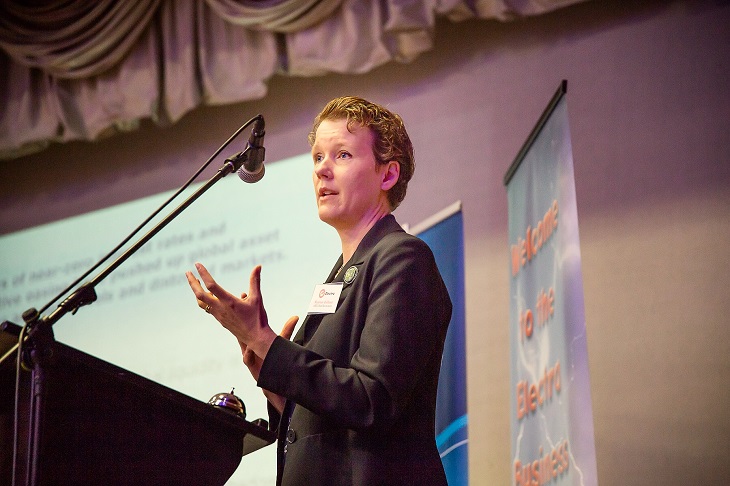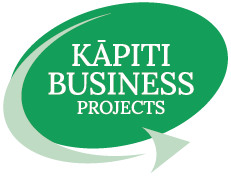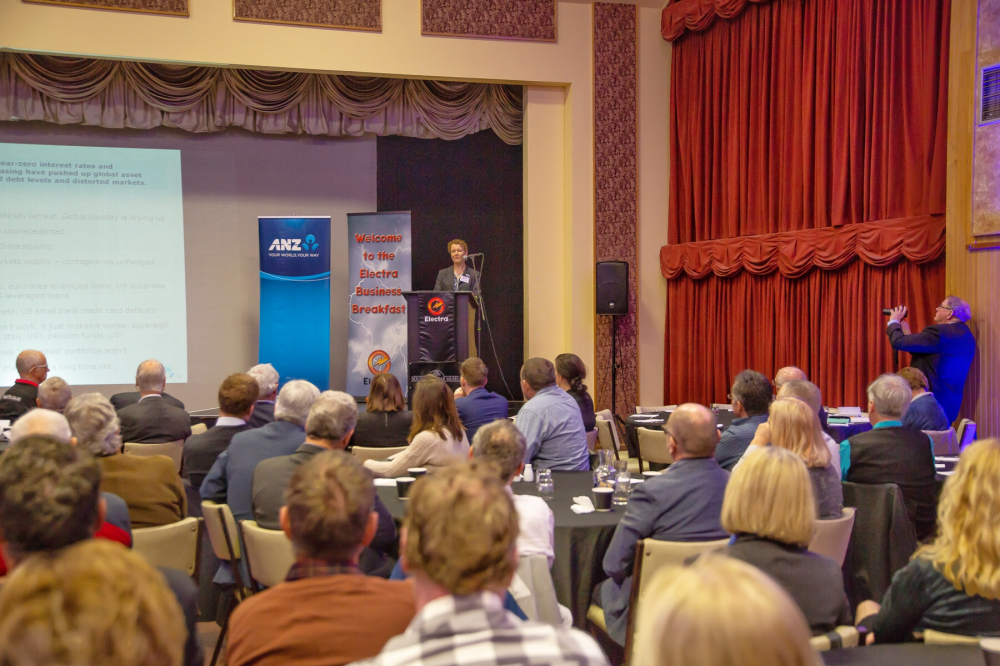How is the economy stacking-up from the perspective of your family and business now and in the immediate future?
Electra Business Breakfast Kapiti hosted Sharon Zollner, the ANZ Chief Economist at this week’s breakfast at Southward Theatre in front of 200 Kapiti and Horowhenua business people keen to hear Sharon’s take on these and other more complex financial matters.

Sharon provided a good insight in to the New Zealand financial situation and said that although 40% of the financial market is based in Auckland, the other centres in New Zealand are performing differently to the main centres Auckland and Christchurch which are seeing a slow down in confidence and growth much due to slow population and poorer productivity growth.
Wellington and Kapiti are humming along just fine and in fact, thanks to population growth is seeing business growth and confidence as a result as well as increasing housing prices.
Sharon said a national cooling down housing market is very much due to the credit restrictions from lenders.
New Zealand is worst in housing affordability in comparison to the free market countries. We have a high personal debt situation reducing other spending. New Zealanders are consuming less, and consumers will get “spooked out” at some point. However according to the survey people in New Zealand are feeling comfortable about their borrowing.
The NZ dollar is strong, and Sharon says ANZ are predicting the US dollar at 62 by the end of the year.
Interest rates continue to be low and do not a put a constraint on business confidence. In the ANZ survey, NZ businesses are asked what their main concerns and constraints are, and Sharon said it certainly isn’t interest rates but rather finding skilled labour. Interest rates are still very favourable for investing. Although she said there is not a lot of confidence in where the economy is going right now in investing for some reason.
Labour – “The labour market is tight. Nominal wage growth hasn’t been fabulous says Sharon but, CPI inflation has been even lower so if you look at real wage growth its tracked growth well. However, there is a productivity issue, if you are not able to be more productive it’s pretty hard to pay higher wages”, she said. Forecast is for nominal wage growth in the next little while because of the public sector settlements plus the rise in the minimum wage. Firms are very reluctant to let good staff go.
Consumers in New Zealand aren’t worried about spending however same people are saying they are cautious as business confidence is down. There is however a disparity in consumer confidence and retail confidence. Normally these two things track closely but recently retail confidence has taken a bit of a dive. Sharon said she believes the higher costs of staff has had an impact for retailers as their margins are being squeezed.
With the fiscal changes and the new family packages, the money is a positive stimulus and should hit consumer pockets about now, and spending could increase, however petrol price hikes could offset that.
Inflation in New Zealand is still low despite the decade strong housing market. Sharon questions the whole myopic focus on CPI inflation as the be all-and-end-all for monetary policy because record low interest rates for the last decade had pushed up asset prices that caused inflation but not in consumer prices. They have caused inflation in asset prices, which has been ‘huge fun for everyone’. Any regulator would say there are financial stability risks as a result of the extremely low interest rates.
The Reserve Bank is forecasting that growth will pick up over the next year before declining a little bit and that the OCR will be on hold until 2020 before starting to pick up. The banks GDP forecasts are weaker than that and foresee a potential OCR cut. Sharon presented The Reserve Banks alternative forecasts but warned to take them as a rule of thumb. Sharon said, “The Reserve Bank has said that if the economy goes down they will be cutting rates”. It appears the Reserve bank is not confident in getting inflation up, they are still more worried about inflation being too low.
The global financial environment is very favourable to NZ – main trading partners and our export prices are really high, and our dollar is relatively low. Our whole primary sector is doing well.
NZ Commodities are selling well overseas, including fruit like apples and kiwi fruit, timber, dairy and even coarse wool has had a resurgent thanks to environmental trends.
However, a few scary things happening is the Federal reserve normalising monetary policy and hyping their official cash rate equivalent by 7 or 8 times rising their interest rates from around 0 to 2% which means that money is starting to flow to the US. And that means its flowing out of other places and in particular it’s flowing out of emerging markets. A lot of those markets have denominated debt in either US$ or Euro, having effects and becoming economically risky business for some countries. New Zealand is not exposed to that kind of risk. New Zealand is not an emerging market and we have very little foreign debt – sitting at about 50% of GDP compared to 80% of it was in 2007. New Zealand are commodity producers.
Insightful and well-spoken Sharon said historic financial forecasting models don’t really work well any more. Globally things have changed and it’s very hard to make predictions and there is much more uncertainty. There are many financial uncertainties to consider and historic trend models are not enough.
Sharon’s team undertakes regular surveys of hundreds of businesses nationwide which is then analysed and commentated. She was an engaging, entertaining and informative speaker who is in a unique position to provide a view of the New Zealand economic machine at work now and in the longer term.
To be part of the ANZ Business Outlook Survey, go to >>
The Electra Business Breakfast runs every month of the year except in January and on the first Wednesday of each month. Electra is the Exclusive Sponsor and Supporter of the breakfast series and they contract Kapiti Business Projects to deliver the breakfast.
To download Sharon’s presentation and subscribe free to receive invitations to attend the Electra Business Breakfast, go to >>
ENDS

Background Information
Sharon joined the Economics team in 2010 and became Chief Economist in late 2017. She started her career as a macroeconomist at the Reserve Bank of New Zealand in 1998, and, has also worked at the Central Bank of Norway. Sharon created the Truckometer in 2012. She has a particular interest in Big Data and machine learning and its potential applications in macroeconomics.
Next Breakfast: Wednesday 3 October with Lauren Foster | Director – Consulting at Deloitte who will be presenting the Deloitte Millennial Survey 2018. The survey shows Millennials’ confidence in business and loyalty to employers has deteriorated. Respondents are yearning for leaders whose decisions might benefit the world, and their careers.
For further information, please contact:
Helene Judge | Kapiti Business Projects | 027 244 9585 | Contact Helene >>
Media and photos credit: Captured By Friday

